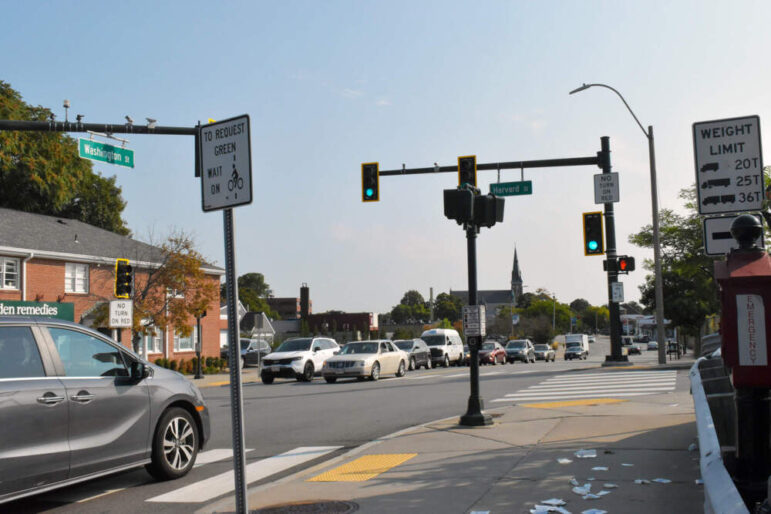Faith leaders in Newton met Tuesday afternoon to talk about how to respond to heightened tensions after last week’s shooting at a small pro-Israel demonstration.
Authorities say Caleb Gannon was walking by the gathering and started yelling back and forth with the demonstrators. Video shows Gannon running and tackling Scott Hayes, 47, of Framingham, who then allegedly shot Gannon. Gannon is expected to survive and to be charged in the case. Hayes has been charged with assault and battery with a dangerous weapon.
Among the faith leaders who met as part of the Newton Interfaith Leadership Association were Rabbi Keith Stern from Temple Beth Avodah and Rev. Cheryl Kerr of United Parish of Auburndale.
Kerr and Stern spoke with WBUR’s All Things Considered host Lisa Mullins.
Interview Highlights
On whether they came away from the meeting with a sense of optimism or next steps:
Rev. Cheryl Kerr: “What I can say is that I am coming away from this meeting with a real understanding that there is a desire among our faith leaders to work together for the sake of peace. We come from many different traditions. Newton is a big place, and it is much more religiously diverse than one might imagine. And we can all agree that violence is never OK and that when someone gets shot, it’s gone too far.”
Rabbi Keith Stern: “I think the direct steps really have to do with our decision as a group of clergy from across the city, from a variety of denominations, to communicate more closely moving forward.
“I think that the situation as it occurred in Newton was shocking for a variety of reasons. … And I think part of the problem is the facts that we don’t know, many of which have been assumed, but we don’t know. There’s so much about this — it’s so combustible in the wrong hands. … I think that we just need to listen carefully. And I think having an interfaith clergy team that’s willing to listen and to respond appropriately with some moderation is probably the best thing that we can represent.”
On tensions that were mounting in Newton for months before the shooting:
Kerr: “It’s a real challenging atmosphere, but what I see more than anything is a desire to learn more about one another and an interest in the others’ humanity. I am constantly meeting with folks that feel like their humanity has been dismissed or that have been in a space where the humanity of others [has] been dismissed.”
Stern: “The anxiety that Jews all across America and including our city — where so many Jews do live and have lived happily and freely for decades — I think for the first time, many of us are feeling a kind of vulnerability that we never expected. If you had said 10 years ago that there would come a time where there would be a concern about the rise of antisemitism and how that might affect my community, I would say, ‘You know, you are an alarmist … .’ But here we are. And I think that there is an enormous unease moving forward.
“You know, the Jewish New Year is coming up in just a couple of weeks. And there’s this great desire to openly embrace the new year and all that it has to offer. But it fills us with not a little bit of dread.
“Last night in our high school program, one of the kids asked to speak to me individually. And she said, ‘Rabbi, I’m filling out an application to go to college. Should I say I’m Jewish or should I leave that blank?’ And I thought, my God, we’re living in a time where a talented, bright student with an enormously gifted future ahead would actually question whether or not she should reveal her Jewishness [when] applying to a university. That, to me, is a real red flag about where we’re at right now. And I think because of that attitude, that sense of vulnerability, this incident that occurred last week really pushed a very, very sensitive button.”
On how they, as clergy, can help deescalate tensions here related to the Israel-Hamas war:
Stern: “There’s some people that don’t think I’m right[-leaning] enough and others don’t think I’m left[-leaning] enough. And I suppose, like articles and media presentations, if both sides are critical, then that means I’m probably in the right place.”
Kerr: “We have a tradition that actually comes out of Christianity’s Jewish roots, which is lamentation, and we spend time in prayer, lamenting the challenges of our human culture and how horrifying it is and lives lost. And we believe that prayer is a means of connecting, and we call that the spirit that does connect us. … What we believe — in my tradition and in many traditions — is that that’s a grace that moves through us and out into others that we communicate with. So all that we built here today in this meeting … will be pastored out to their people and those people will pastor it out in love.”
On whether Stern has ever had another time as a rabbi that was this difficult:
Stern: “I would have to say that since Oct. 7th, it has never been so daunting. I’ve never felt that I’ve had to carry such a heavy burden, so much grief, and so much anguish for so many people.”
This article was originally published on WBUR.org.

